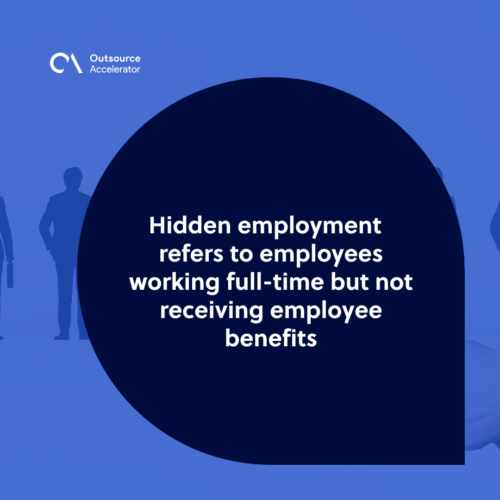8 hidden employment identifiers to watch out for

Since the pandemic, some companies can no longer afford to expand their workforce and support their employees’ needs.
One thing that employers think may help them reduce costs and speed up the hiring process is hidden employment.
People who fall under this employment scheme lose time, waste effort, and an opportunity to grow with a career that matches their skills and competencies.
Job seekers must be aware that it is illegal to work at a job where the employer doesn’t put their income on record. They should also know that it’s risky to work in an organization with an unclear labor force policy and cryptic details in terms of regulatory compliance.
This article will discuss what hidden employment is, the signs to identify it, and how to avoid this employment scam.
Defining hidden employment
Hidden employment is mainly called disguised employment. It refers to employees working full-time but not receiving employee benefits.
This type of employment often disguises itself as a contractual or freelancing job, even if there is an employer-employee relationship.
In other words, employees under hidden employment are assigned to perform employee duties but are misclassified as freelancers or self-employed.
Employers do this to save costs in complying with taxes or employee contributions. It sounds like a brilliant idea for employers. However, the government prohibits this type of employment because it fails to comply with the mandatory benefits and tax laws.

Alternatively, hidden unemployment (aka disguised unemployment) refers to a situation where individuals who are capable of working and willing to work are not included in official unemployment statistics.
This can happen when people become discouraged and stop actively seeking work due to a lack of available jobs or other factors.
Although they are unemployed, they are not counted in traditional unemployment figures. This creates a “hidden” segment of the workforce facing joblessness.
8 ways to identify hidden employment
Easy-looking job offers easily sway some people. Although the job seems safe and uncomplicated, it is not valid in most cases, like disguised employment.
Here are eight ways to identify hidden employment:
1. Too-good-to-be-true job offers
One of the best ways to identify hidden employment is to ensure the company has an actual need for an employee’s skills.
Remember that employee misclassification is linked with hidden employment and occurs when employees are positioned to do a given role that is not aligned with their skill set. Additionally, they may lack employee protection.
Consider the following precautions before accepting a job offer:
- Inaccuracy. The position isn’t aligned with the company’s business objectives and the employee’s career goals.
- Job postings promise easy work. Just because a company offers a light workload and a big salary doesn’t mean it’s a legitimate offer.
Instead, study the offer more in-depth and consider reading reviews if it is a good workplace to start your career.
2. Lack of onboarding process
The primary objective of the onboarding process is to ensure that employees know their roles and responsibilities satisfactorily. It assures that employees clearly understand what matters and what they need to do their jobs correctly.
Without a successful onboarding process, it will take a long time for employees to adjust to the work environment.
3. Unusual work location
A good work environment must reflect an individual’s professionalism.
Be cautious with a company that positions its employees in unlikely places, like in the basement or lounge. Unless it is in line with your job role and description.
4. Lack of website presence
When looking for a company, ensure they have a digital presence. If they don’t, they are either unwilling or unable to afford it.
On the other hand, if the firm is just beginning to create its brand, this is an important consideration.
5. Work has an unusual schedule
A random schedule might be a red flag and would mean that the company can’t find enough work to keep its employees busy.
6. Requires excessive overtime
Overtime is essential in the workplace, but it shouldn’t be excessive. A work-life balance is critical to employee health.
If an employer requires work for long hours but is unwilling to pay appropriately, this could signify hidden employment.

7. The hiring process is strange
Before applying, check out the company’s hiring process. Make sure it has a proven track record of finding the right candidate.
One way to spot a strange hiring process is if the employer asks unrelated interview questions to the field of work.
8. Payment doesn’t make sense
A legitimate and trustworthy company will not require personal payments from candidates or new hires.
If it’s about a paycheck, it should match what an employee is paid for the hours she worked –
without unexpected deductions.
3 tips to avoid hidden employment
Here are the three essential tips to avoid disguised employment scams:
Do some research
Keep in mind that it’s always best to research before beginning an employment relationship. It will help identify potential company red flags and avoid hidden employment scams.
Contact them directly
Some business websites are not genuine companies but are just fronts for fake freelancer jobs. Do not go through recruiters or middlemen who promise the best offers and packages via email.
Don’t be afraid to inquire for more info.
Ask the employer to provide more information about the position, which is essential for both parties to know.
Employers under hidden employment rarely answer questions or give more details about their job postings.
Check the signs to avoid hidden employment scams
There are risks and penalties for hidden employment because of its non-compliant nature with the mandatory government requirements.
Review the signs above to learn how to avoid employment scams and make your job search more enjoyable and safe.







 Independent
Independent




